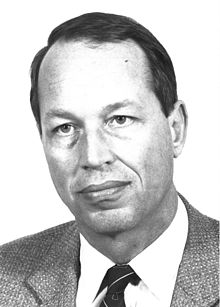Rutger van Santen
Rutger Anthony van Santen (* 1945 in Langedijk ) is a Dutch chemist who studies the molecular principles of heterogeneous catalysis and physical chemistry.
Van Santen attended grammar school in Middelburg and studied chemistry at the University of Leiden with a bachelor's degree in biochemistry in 1966 and a master's degree in theoretical organic chemistry in 1967 as well as his doctorate under LJ Oosterhoff in 1971 (On the theory of resonant scattering). He was a post-doctoral student at the Stanford Research Institute (SRI) with FT Smith. From 1972 he was with Shell Research in Amsterdam , where he stayed until 1988 and was most recently head of the department of catalysis and physical chemistry. From 1982 to 1984 he was with Shell Development in Houston . In 1986 he became associate professor for surface chemistry at the TU Eindhoven and in 1988 full professor for catalysis. From 1992 to 2000 he was the founding director of the Dutch Research Institute for Catalysis (NIOK). From 2001 to 2005 he was rector of the TU Eindhoven. In 2004 he received an academy professorship. He is the director of the Graduate School of the Dutch Research Institute for Catalysis (NRSC-C).
In 1976 he was visiting professor for theoretical chemistry at the Free University of Amsterdam . In 2004 he was Miller Visiting Professor at Berkeley. In 2011 he was visiting professor at the Technical University of Munich.
He deals with theoretical, experimental and industrial aspects of heterogeneous catalysis, its mechanisms and the synthesis of catalysts and computer calculations of the chemical reactivity on surfaces. The numerical methods he uses include the Car-Parinello method of molecular dynamics and the spectroscopic methods he uses include in situ positron emission tomography .
In 1997 he received the Spinoza Prize . In 1998 he received an honorary doctorate from the Polytechnic University in Kiev. In 1996 he was a Bourke Lecturer at the Royal Society of Chemistry , in 1981 he received the gold medal of the Dutch Chemical Society, in 1991 he gave the Chiapetta Lecture of the North American Catalysis Society, and in 2000 he gave the Karl Ziegler Lecture at the Max Planck Institute for Coal Research and in 2009 the Francois Gault Lecture of the European Catalysis Society. In 2001 he received the Alwin Mittasch Prize in Mülheim.
In 2001 he became a member of the Royal Netherlands Academy of Sciences and in 2008 of the National Academy of Engineering . In 2009 he became a Fellow of the Royal Society of Chemistry . He is a knight of the Order of the Dutch Lion.
Fonts
- Theoretical Heterogeneous Catalysis, World Scientific 1991
- with Matthew Neurock: Molecular Heterogeneous Catalysis: A Conceptual and Computational Approach, Wiley-VCH 2006
- Editor with Gabriele Centi: Catalysis for Renewables: From Feedstock to Energy Production, Wiley-VCH 2007
- Editor with Philippe Sautet: Computational Methods in Catalysis and Materials Science: An Introduction for Scientists and Engineers, Wiley-VCH 2009
- with D. Khoe, B. Vermeer: The thinking pill: and other technology that will change our lives, Nieuw Amsterdam 2007
- with Djan Khoe, Bram Vermeer: 2030: Technology That Will Change the World, Oxford UP 2010
- Editor with Matthias Beller, Albert Renken: Catalysis: From Principles to Applications, Wiley-VCH 2012
- Modern Heterogeneous Catalysis: An Introduction, Wiley 2017
Web links
| personal data | |
|---|---|
| SURNAME | Santen, Rutger van |
| ALTERNATIVE NAMES | Santen, Rutger Anthony van |
| BRIEF DESCRIPTION | Dutch chemist |
| DATE OF BIRTH | 1945 |
| PLACE OF BIRTH | Langedijk |
